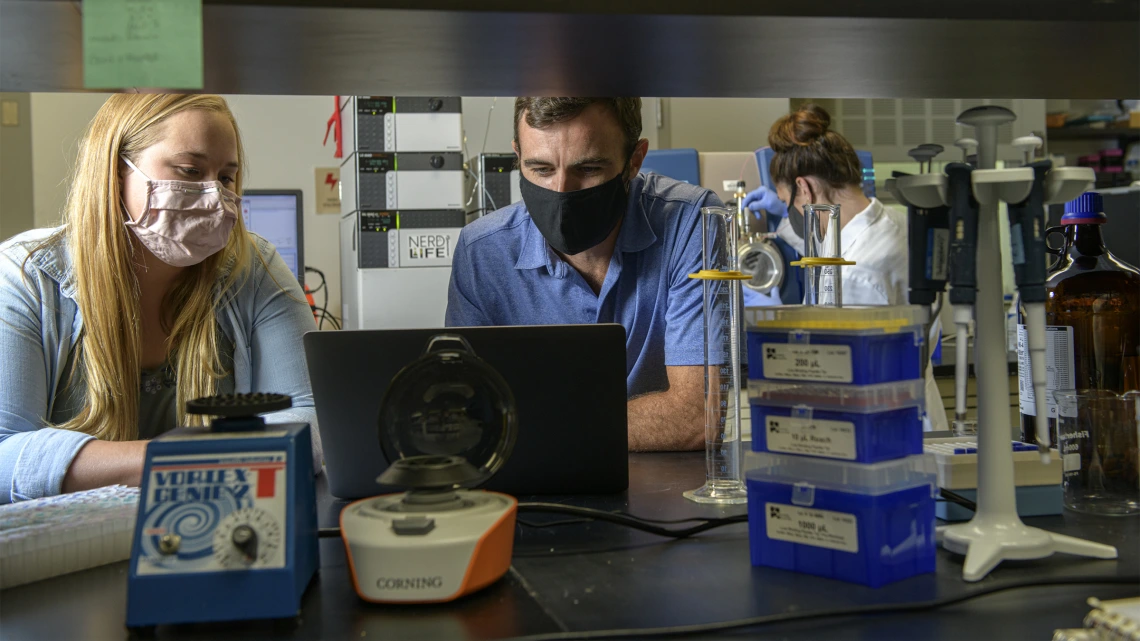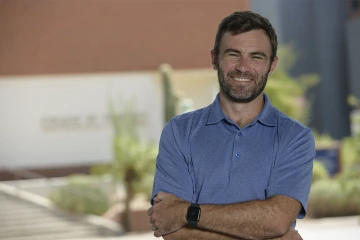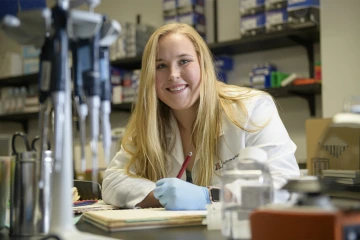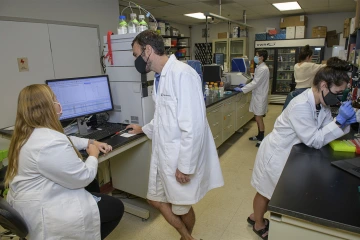An Inside Look at Mentoring in a Pharmacy Lab
Health Sciences researchers are recognized for mentoring students in the lab. Here’s a look at how one PI guides a graduate research assistant.

Erin Jennings is a doctoral research assistant working in the lab with James Galligan, PhD, in the College of Pharmacy.
James Galligan, PhD, studies cellular metabolism to find the causes of diseases such as cancer and diabetes. The assistant professor of pharmacology and toxicology at the University of Arizona Health Sciences recently received a $1.8 million grant from the National Institutes of Health to study how diseases originate.

James Galligan, PhD
As Dr. Galligan works to answer those questions, he’s earned a reputation as a mentor to the students who work with him.
Among those being trained by Dr. Galligan is Erin Jennings, a doctoral research assistant. She completed one of her required lab rotations with Dr. Galligan, and the experience led to a permanent position for her. Jennings is working on her PhD in pharmacology and toxicology.
Jennings and Dr. Galligan shared insights into how they collaborate and why they enjoy the challenge of rooting out the causes of diseases.
What is the goal of the research in this lab?
Dr. Galligan: To find new mechanisms that go awry and cause diabetes and cancer. People consider diabetes to be a disease of one organ, but it affects the whole body. Your fat causes signaling, and that affects your pancreas. Your pancreas causes signaling that affects your liver. It’s a whole-systems approach. If you understand basic mechanisms, then they can largely apply to everything, as opposed to trying to attack the whole disease at once.
How did you both get involved in this type of research?

Erin Jennings is a doctoral research assistant in the Galligan Lab.
Dr. Galligan: My research has always focused on protein modifications and their role in disease. These modifications result from cell metabolism through either spontaneous or enzyme-controlled mechanisms. This inevitably led me down the path of studying metabolism to determine the sources of these modifications and how they are regulated.
Jennings: I didn’t choose labs for my rotations based solely on what they were researching. I didn’t have a specific disease I wanted to study. The ability to learn new, diverse techniques and use chemistry while rotating in Dr. Galligan’s lab was very appealing. My background is not in chemistry, but these techniques push me to learn more about how things work.
Is there a characteristic, personality trait or work style that you seek in a lab assistant?
Dr. Galligan: I look for people who want to be here. There are labs that require you to be there at designated times and I don’t believe in that. I’ve always liked to work, and I’ve always liked the science. That’s why we have rotations, so you can kind of feel it out in a rotation, you know if somebody is interested in science and interested in being there, that they care and they want to see the result. That’s what I look for.
Jennings: When I did my rotation in this lab, I had my own project while helping with other things that needed to be done in the lab. I explored what the lab culture was like, and whether they worked the way I like to work, and what the people were like to work with. The people are a big portion of why I enjoy this lab, in addition to the ability to learn new scientific techniques.
How would you describe Dr. Galligan’s mentoring and leadership style?

In the lab of James Galligan, PhD, where cellular metabolism is the primary area of inquiry.
Jennings: He has you do a lot of your own thinking, which pushes you to actually understand what you’re doing, but he will help you out when you’re struggling, too.
Dr. Galligan: I feel when a researcher can take ownership and have the opportunity to pursue their own scientific interests, this ensures that they stay interested, rather than being told what to do. Staying ‘hands-off’ also allows for more growth and understanding, rather than being given a set list of experiments to complete without a full understanding of the bigger picture.
Jennings: And that’s one of the things I was looking for: someone who could be there when I need them, but also let me learn how to think and learn how to fail.
How will your experience working in this lab help you professionally?
Jennings: I’m hoping to go into industry, for example government or pharmaceutical companies. Right now, I’m leaning toward pursuing a regulatory toxicology position. I really enjoy bench work, but I don’t know how long I will want to do that. Ideally, I’d like a career where I get to use the knowledge and skills I’ve gained here, including thinking like a scientist, and being able to apply it to everyday life to help keep people safe and help improve the health of others.
What is the motivating factor that keeps you showing up every day?
Dr. Galligan: Answering questions that aren’t answered. I have friends who are very envious of the fact that I don’t do the same thing every day. The end result is completely unknown, and that’s what’s fun about it. You have no idea what you’re going to get, most of the time it’s the opposite of what you think is going to happen, but it still keeps you on edge. If you’ve been doing research long enough, you kind of notice that things take a long time, it’s just how it goes, and that’s why it’s fun to work on multiple projects at a time. I think it’s fun.

